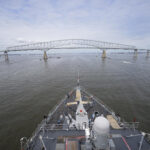The U.S. Department of Homeland Security (DHS) hosted a “National Small-Vessel Security Summit” conference in Arlington, Va., last month that could lead to several important changes in the nation’s maritime-security posture. Small vessels – i.e., those less than 300 gross tons – have been a vehicle of choice for terrorists in carrying out previous maritime attacks such as those against the U.S. guided-missile destroyer USS Cole, the tank vessel Limburg, and numerous Sri Lankan naval vessels. Small vessels also have been, for decades, a common vehicle for the smuggling of illegal migrants, drugs, and other contraband into the United States. Despite that background, small vessels have received relatively little attention in the maritime security regulations developed to date; in the more than five years since the 9/11 terrorist attacks, however, they have increasingly become the focus of government concerns in the field of port and maritime security. The stated objectives of the 19-20 June summit meeting were to: discuss the government’s perspective on an important but previously overlooked problem; educate summit attendees on the security risks posed by small vessels; provide a national forum for port and maritime stakeholders to air their own concerns; andentify a way ahead in addressing small-vessel security. Participants at the summit included representatives from recreational-boating and passenger-vessel associations, towboat operators, and the commercial fishing industry as well as state and local governments. Representatives from various federal agencies – specifically including the Coast Guard, the DHS Customs and Border Patrol division, and the Federal Bureau of Investigation – also attended to listen to and understand the perspectives of small-vessel operators. A Formidable Phalanx of Kickoff Speakers The first day of the summit started with presentations from such senior federal officials as DHS Secretary Michael Chertoff, Coast Guard Commandant Admiral Thad Allen, and W. Ralph Basham, the commissioner of U.S. Customs and Border Protection. Each of these speakers assured the audience that the summit was not a referendum on the licensing of boat operators but, rather, a forum for the exchange ofeas to improve U.S. port and maritime security while also maintaining the freedom of private citizens and the nation’s port and maritime industries to use the U.S. coastal and inland waterways. As Secretary Chertoff stated, “We don’t want to give edicts from Washington, but … [want to] use this forum to partner with stakeholders to jointly develop solutions.” He quickly added, though, that, “We can’t waste time, because the enemy is not wasting time.” The afternoon of the first day featured three panel discussions expressing the interests of recreational boaters, commercial vessel operators, and state and local government representatives. Although each group had a number of individual or collective perspectives to discuss, there also were several common themes articulated. One was that small-vessel operators are willing to be part of the solution, but any new The small-vessel communities offer a huge and frequently overlooked source of additional eyes and ears that could be tapped into by the government to spot suspect behavior requirements imposed on them should be based on the proven effectiveness of those requirements. Another was that the small-vessel communities offer a huge and frequently overlooked source of additional eyes and ears that could be tapped into by the government to spot suspect behavior. A third theme, less forward-looking, perhaps, but of obvious importance, was that relations between the Coast Guard and small-vessel operators have become more strained in recent years than they had been previously. There also was general agreement that the threat of maritime terrorism must be quickly and adequately addressed – but without damaging the nation’s maritime industries. Smart Security – at a Reasonable Cost By the end of the summit there seemed to be a clear consensus on several points. The first and most important is that the small-vessel community must be incorporated into the U.S. homeland-security structure as an active partner. To make that possible, though, members of the community must be educated in such particulars as what constitutes suspicious behavior, how to make reports, etc. There also was general agreement that the Coast Guard needs to strengthen its working relationships with the nation’s maritime stakeholders. Most of the summit participants seemed to believe that many of the problems discussed in this area should be addressed, and could be ameliorated, through an expansion of the America’s Waterways Watch program – a Coast Guard public outreach initiative developed to educate boaters both on maritime security and on the several ways already available to report security concerns. Perhaps the most important common theme, though, was the frequently expressed need to find the proper balance between maintaining security and running a business. As one participant put it, “Freedom isn’t free, but security shouldn’t be dumb.” The gains achieved at the summit conference seem to complement that sentiment and should serve as a significant step toward fostering a comprehensive understanding – on the part of all stakeholders, government as well as industry – of the numerous complicated issues that still hinder progress in the previously neglected field of small-vessel security.

Joseph DiRenzo III
Dr. Joseph DiRenzo III is a retired Coast Guard officer. He's visiting fellows at the Joint Forces Staff College. He has written extensively on maritime security issues. Any opinions expressed in the preceding article represent their own views and are not necessarily the official views of the U.S. Coast Guard.
-
Joseph DiRenzo IIIhttps://domesticpreparedness.com/author/joseph-direnzo-iii
-
Joseph DiRenzo IIIhttps://domesticpreparedness.com/author/joseph-direnzo-iii
-
Joseph DiRenzo IIIhttps://domesticpreparedness.com/author/joseph-direnzo-iii
-
Joseph DiRenzo IIIhttps://domesticpreparedness.com/author/joseph-direnzo-iii






